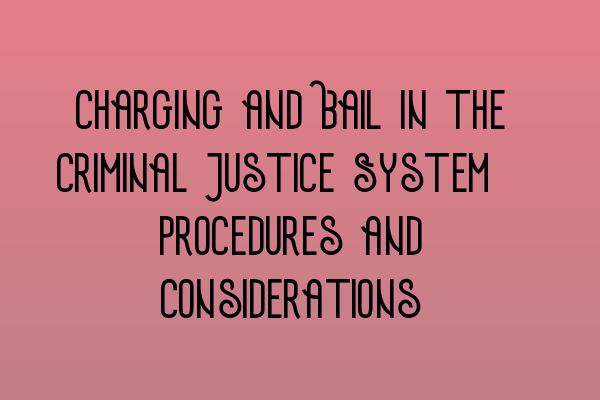Charging and Bail in the Criminal Justice System: Procedures and Considerations
At SQE Criminal Law & Practice Law UK, we understand the importance of comprehending the procedures and considerations behind charging and bail in the criminal justice system. Whether you are a solicitor, aspiring lawyer, or simply interested in the field, this blog post will provide you with valuable insights into the legal aspects of charging and bail.
The Charging Process
In the criminal justice system, the process of charging an individual involves formally accusing them of committing an offense. This initial step plays a crucial role in the overall legal proceedings. Understanding the charging process is essential for effective legal representation.
Before addressing the specifics of the charging process, it is important to note that the timing of charges can impact the entire case. Early intervention by a skilled solicitor can greatly influence the outcome of the trial. It is therefore advisable to seek legal advice promptly.
Gathering Evidence and Investigation
Prior to charging an individual, law enforcement agencies conduct thorough investigations and gather evidence. This evidence aims to establish probable cause and identify the alleged offender. It is imperative that investigators follow proper protocols and maintain the integrity of the evidence.
Reviewing Evidence and Legal Considerations
Once evidence is gathered, it is reviewed by legal professionals to determine if sufficient grounds for charging exist. Solicitors play a crucial role in assessing the strength of the evidence against their clients. Expert legal analysis is essential to ensuring a fair charging process and avoiding wrongful accusations.
SQE 2 Preparation Courses and SQE 1 Preparation Courses provide comprehensive training for aspiring solicitors and lawyers, equipping them with the necessary knowledge and skills to navigate the charging process effectively.
Deciding on Charges
When reviewing the evidence, legal professionals must determine the appropriate charges to be filed. The charges selected must align with the evidence and the law. Solicitors must carefully consider the implications of each charge and their potential impact on the overall strategy.
Consulting experienced solicitors and staying informed about recent legal developments can significantly enhance one’s understanding of the charging process. Our SRA SQE Exam Dates article provides valuable information on upcoming exams and legal updates relevant to the charging process.
The Bail Process
Bail is a crucial component of the criminal justice system that allows individuals charged with an offense to be released from custody while awaiting trial. The primary purpose of bail is to strike a balance between the rights of the accused and the public’s safety.
In the UK, the decision to grant bail is made based on various factors, including the seriousness of the offense, the strength of the evidence, the likelihood of reoffending, and the individual’s ties to the community. Bail decisions must adhere to legal principles to ensure fairness and justice.
Bail Application
In order to secure bail, the accused, or their legal representative, must make a bail application. This application includes relevant information about the accused, such as their address, employment, and personal circumstances. It is crucial to present a strong bail application supported by compelling arguments and evidence.
To gain further insight into the bail application process, our SQE 1 Practice Mocks FLK1 FLK2 article offers valuable practice exams and quizzes that can enhance your understanding of the bail process.
Bail Conditions
If the court grants bail, it may impose certain conditions to ensure the accused complies with legal requirements and does not pose a risk to society. Common bail conditions include reporting to a police station, surrendering travel documents, or residing at a specific address.
Bail Variation and Revocation
In some cases, it may be necessary to vary or revoke bail conditions based on changing circumstances or concerns regarding compliance. Solicitors play a vital role in advocating for their clients and presenting compelling arguments for bail variations or revocations.
Continual professional development is crucial for solicitors dealing with charging and bail matters. Our SQE 1 Practice Exam Questions article offers practice quizzes that can assist you in enhancing your knowledge and staying up to date with recent legal developments.
Conclusion
Charging and bail processes are pivotal stages within the criminal justice system. Understanding the procedures and considerations associated with charging and bail is essential for solicitors, lawyers, and anyone interested in the field of criminal law.
At SQE Criminal Law & Practice Law UK, we provide comprehensive training programs, including SQE 2 Preparation Courses and SQE 1 Preparation Courses, to equip aspiring solicitors and lawyers with the knowledge and skills required to navigate the charging and bail processes effectively.
We encourage legal professionals to remain informed through our articles and updates on SRA SQE Exam Dates. By continually enhancing your understanding of charging and bail, you can provide the best legal representation to your clients and contribute positively to the criminal justice system.
